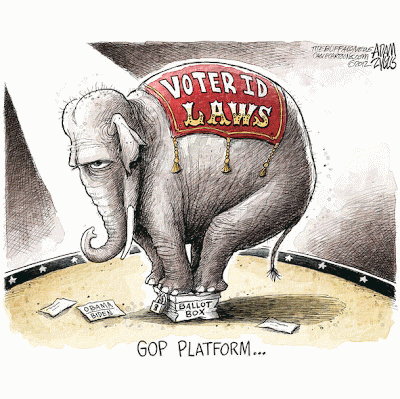This article co-written by Bob Fitrakis
The Republican Party could steal the 2012 US Presidential election with relative ease.
Six basic factors make this year's theft a possibility:
1. The power of corporate money, now vastly enhanced by the US Supreme Court's Citizens' United decisions;2. The Electoral College, which narrows the number of votes needed to be moved to swing a presidential election;
3. The systematic disenfranchisement of -- according to the Brennan Center -- 10 million or more citizens, most of whom would otherwise be likely to vote Democratic. More than a million voters have also been purged from the rolls in Ohio, almost 20% of the total vote count in 2008;
4. The accelerating use of electronic voting machines, which make election theft a relatively simple task for those who control them, including their owners and operators, who are predominantly Republican;
5. The GOP control of nine of the governorships in the dozen swing states that will decide the outcome of the 2012 campaign; and,
6. The likelihood that the core of the activist "election protection" community that turned out in droves to monitor the vote for Barack Obama in 2008 has not been energized by his presidency and is thus unlikely to work for him again in 2012.
Winning a fair and reliable electoral system can be achieved only with a massive grassroots upheaval.
The power of money is now enshrined by the infamous Citizens United decision. In at least 90% of our Congressional races and at least 80% of our US Senate races, the candidate who spends the most money wins.
From the presidency to the local level, our elections -- and thus control of our government -- are dominated by cash.
For more than a century, the ability of corporations and the super-rich to buy in directly has been legally constrained. But the concentration of media ownership in the hands of ever-fewer corporations has vastly enhanced their power.
Already in 2012, the tsunami of dollars pouring in from corporations and super-rich individuals has soared to entirely new levels. Even the floodgates opened by Citizens United can't handle the flow. With its June decision denying Montana's attempt to keep some spending restrictions in tact, the John Roberts US Supreme Court has inaugurated an era in which virtually unrestrained "pay-to-play" money will re-define the electoral process. Republicans in the US Senate have also blocked attempts to require that these campaign "donations" be made public.
It's not hard to guess where this leads. The June, 2012, recall election in Wisconsin saw at least eight times as much money being spent on protecting Republican governor Scott Walker as was spent to oust him.
(Note: You can view every article as one long page if you sign up as an Advocate Member, or higher).






